It wasn’t even 8 AM yet, and it didn’t take a genius to realise why I needed to queue for more than two hours just to stand in front of Sushi Dai at Tsukiji Fish Market and stare at people eating sushi. The famous Japanese Sushi restaurant is the same size as my room back home. It has only like 10 seats and the chefs took their time to talk with customers.

A quick Google search (thanks to the hours of queuing) revealed that Sushi Dai practices a Japanese tradition called Omakase.
Omakase Meal in Japanese Culture
Omakase (pronounced oh-mah-kah- seh), simply put, means the chef’s choice, it’s a multi-course meal in Japanese culture where we let the chef choose our food for us. Also, unlike most sushi places, the chefs take their time to have a conversation and explain each dish they choose for us. It was my first Omakase meal, the next time I had Omakase, it was at the remarkable Jiro Sushi.

I was doubtful about letting others pick my food; I am a picky eater, more so when it comes to sushi. When I was trying to decide what to do, the lady who took the orders came. She showed me a sheet of paper with two lines of Japanese words and 2,600 and 4,000 yen written on it. “Choose,” she instructed us in English. I asked her what’s the difference between the two prices.. “6 pieces of sushi or 10 pieces of sushi with one bonus sushi” she answered.
Full Course of Sushi Omakase at Sushi Dai
Initially, I chose the 2,600 yen as I wasn’t sure I would enjoy eating sushi for breakfast. But everyone else in the queue ordered the full course. At the very last minute, I decided not to half-ass my experience with Japanese food, especially since I had been queuing for hours. I told her I wanted to change my choice from 6 to 10+1 while praying I could stomach raw fish before even taking my morning dose of coffee.
8:15 AM and we were in. Or to be exact, we squeezed ourselves inside Sushi Dai, took our seats, and we were ready to be served our Japanese sushi breakfast.

The first serving was fatty tuna. Oh man, my mouth is watering now just remembering it. It was absolutely delicious! There and then, I knew I had made a good decision to order the full course.
We were also served miso soup on the side, together with hot green tea and a small brick-sized serving of egg omelette and ginger. The purpose of the ginger is to cleanse your palate before you eat the next sushi – I only found out about this when we were halfway through our meal. Then came silver-skinned horse mackerel with wasabi garnish. I didn’t know how it got the name, but I was so glad that it was on my table and later in my mouth.

There was another type of tuna sushi, a slice of glistening red-coloured meat laid on top of sushi rice. It tasted fresh and delicious. I have started to become deliriously happy about my sushi breakfast at this Japanese restaurant I found out about and qued at only a few hours ago.

The chef served the red clam sushi with a warning. “It’s still alive“, he said. And I thought, “Eh?!” — It’s one thing to slurp oysters, but eating live seafood on top of rice felt unusual. But it didn’t stop me for long. I took one bite and, of course, loved it as well.
Sea Urchin Sushi

There were a few more sushi served, but I am not going to post them here because it would be a repetition of yummy, so good, delicious, and amazing. The strangest one I tried was the sea urchin. It looked unappealing to me, but I ate it anyway. Let’s say I wouldn’t order it from a menu again.
We were also served maki, this time the sushi roll of tuna and cod roe. As we reached the end of the sushi journey, I started to feel full and very satisfied.

Finally, the chef let us pick any type of sushi we wanted for our bonus round. We could go for abalone, octopus, and even sperm sacs of the codfish. I asked for his recommendation and the chef suggested prawn, so Amaebi prawn it was. Juicy and a little sweet, it was the perfect ending to a perfect sushi experience.
The Itamae at Sushi Dai

Other than putting the finest sushi on my plate, I really liked the way the chefs interacted with us. There were three chefs and each of them served 3 to 4 customers. The one who served me was a young and friendly chef. He greeted me with “Apa kabar?” and “Namaste” to my new friend when we told him where we were from.
The main chef was full of smiles and looked like he really enjoyed working as a sushi chef. I asked the chef how long it takes to become an Itamae (sushi chef), and he answered, “20.” 20? Like 20 years?! Wow! What dedication. I felt more appreciative of the whole experience. Also, even if it is such a small place and we needed to wait for hours to get it, the vibe inside was excellent.
The whole meal took around 35 minutes. We thanked the chef, told them we were “very oishii!” and stepped out.
Sushi Dai address: Take the train to Tsukiji station and get down at Tsukiji market exit. The restaurant is located inside the market ground.The actual address is at 5 Chome-2-1 Tsukiji, Chūō, Tokyo 104-0045, Japan. Walk around, I am sure you won't miss the long que of hungry people.
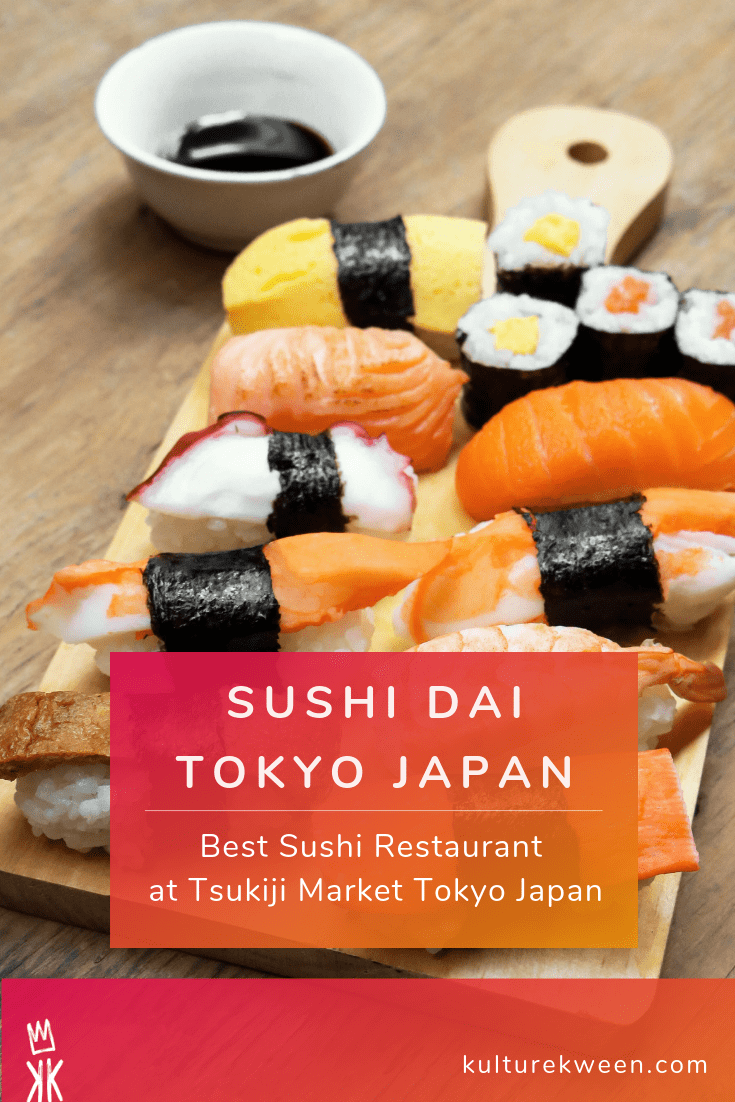
Follow me on Instagram @KultureKween for more recent updates.

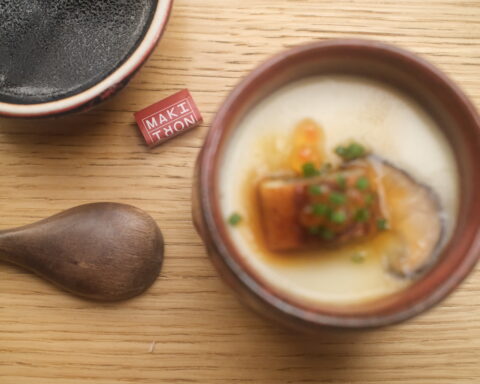
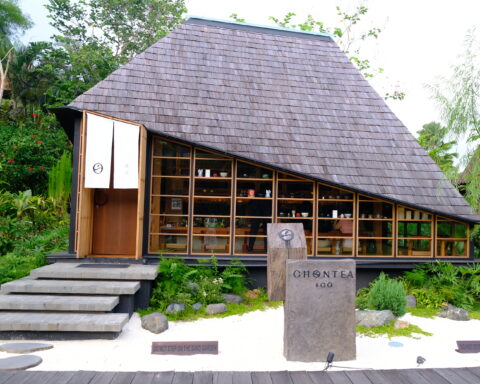
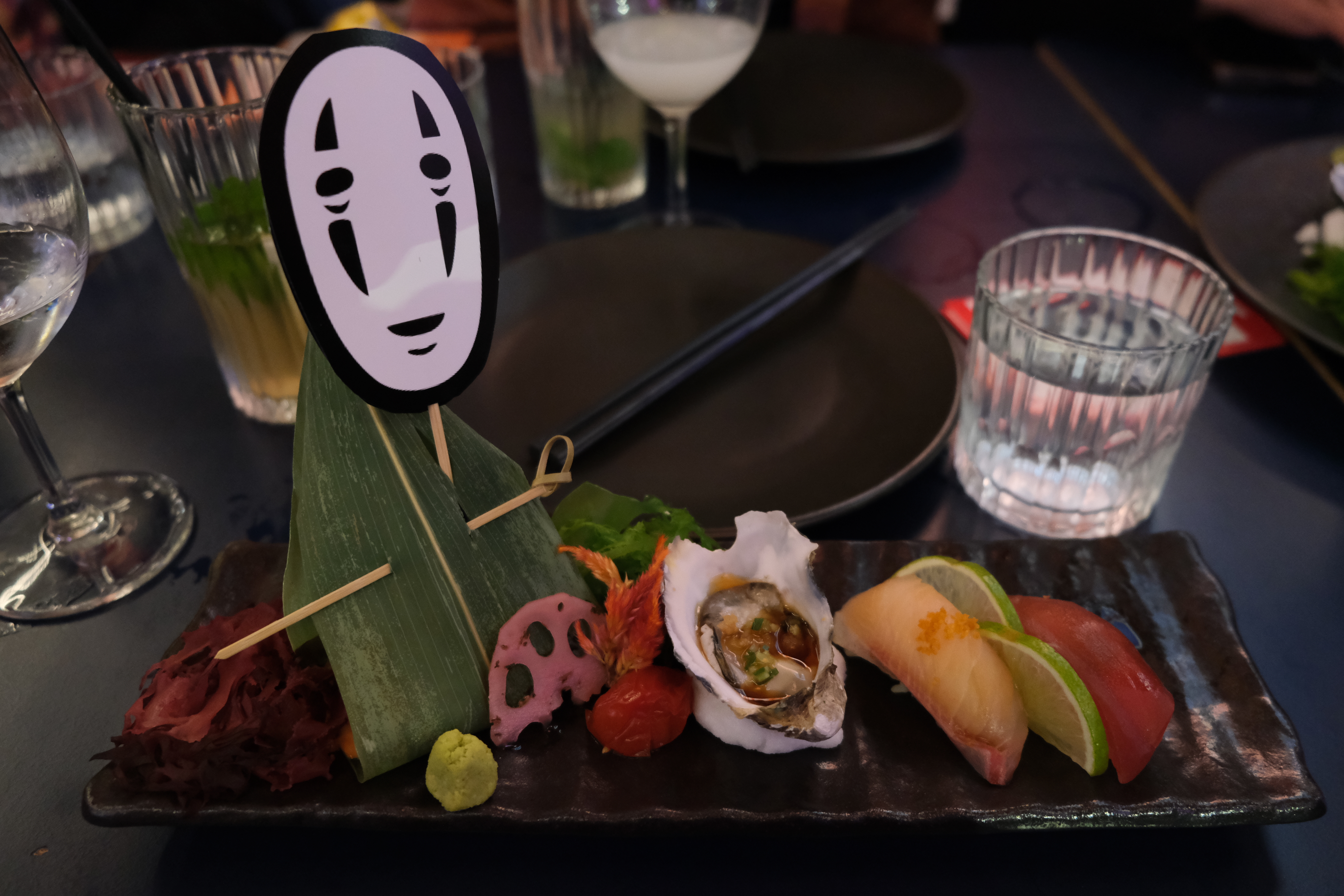
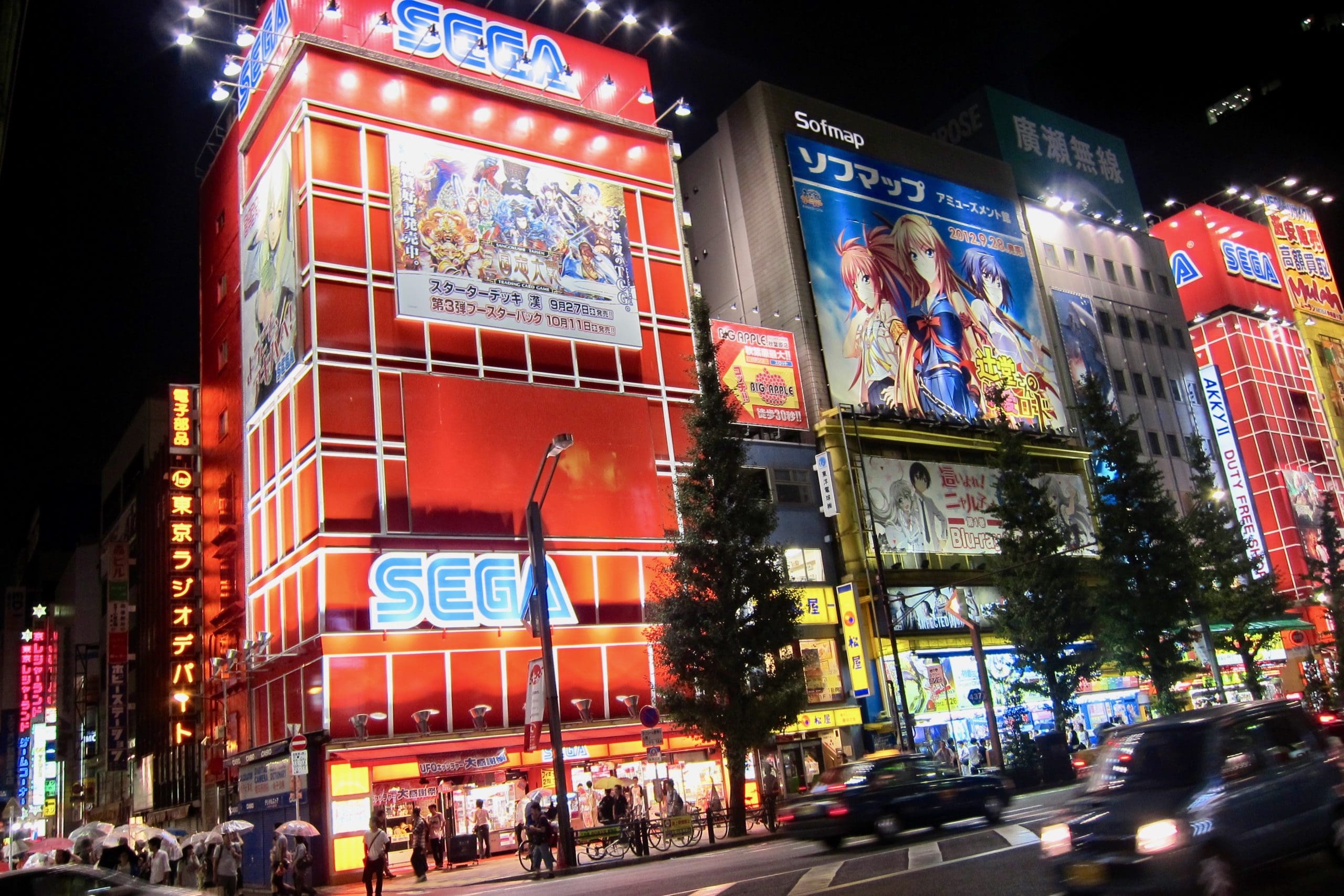
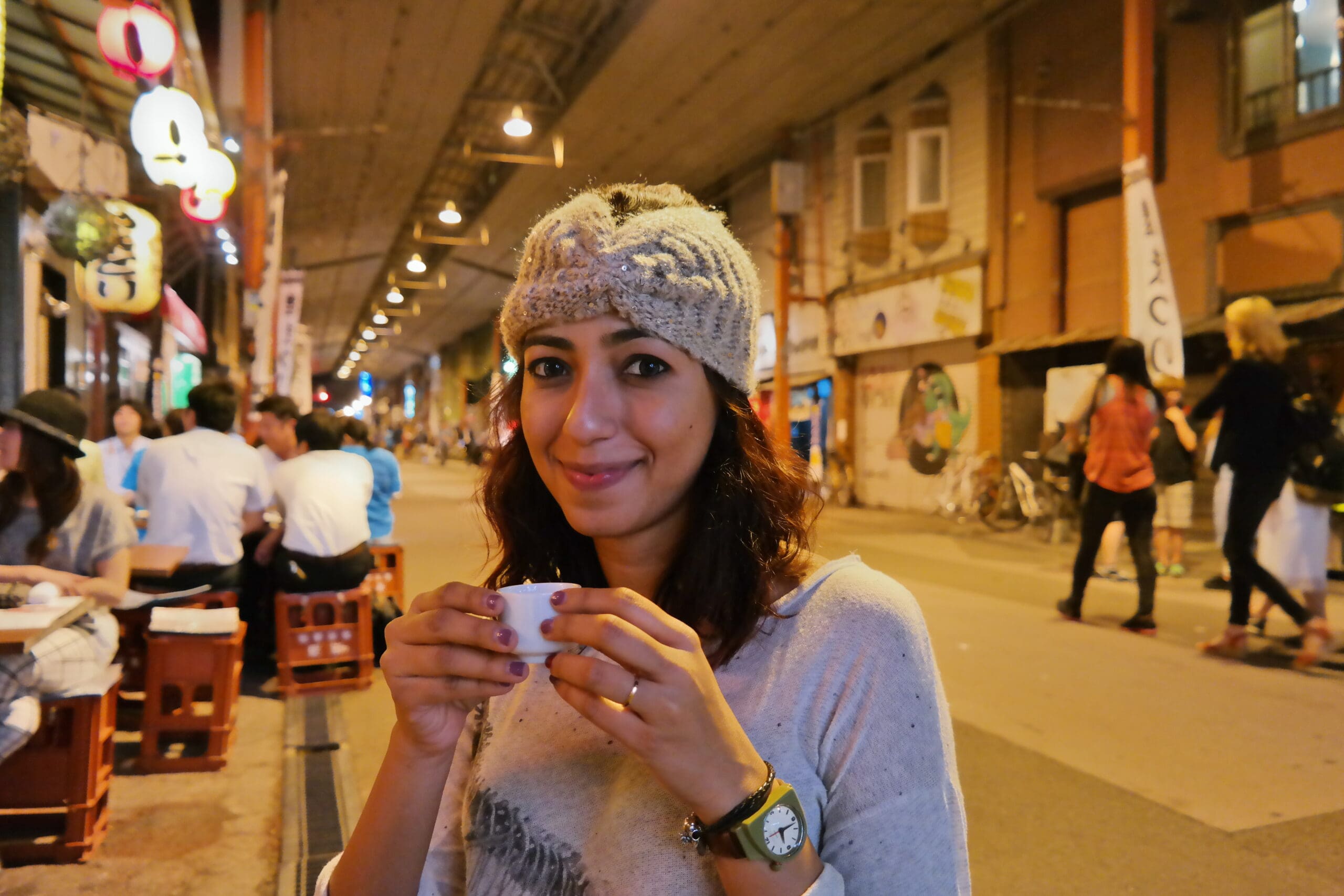
[…] it? Is it a sushi train?” I asked Fafa. The prospect of eating sushi on a sushi train in London felt like a delightful […]
[…] train (Kaitenzushi) restaurant, a unique part of Japanese food culture, is a sushi restaurant where you sit surrounding a conveyer belt on which small plates of freshly made sushi rotates until […]
[…] Eat at Sushi Dai in Tokyo. […]
[…] Sushi Dai Best Sushi Restaurant At Tsukiji Market Tokyo […]
[…] in the birthplace of the food culture, Japan. The first time I had Omakase was sushi breakfast in Sushi Dai, Tokyo. Ever since it had been my best sushi eating experience until I had a meal of a lifetime at Jiro […]
[…] Sushi Dai Best Sushi Restaurant At Tsukiji Market Tokyo […]
[…] as 5 AM, from some of the best Sushi restaurants in Tokyo. So I did just that, I qued in front of Sushi Dai. Made friends while waiting in the queue. Had my first Omakase experience. Went back to the hotel, […]